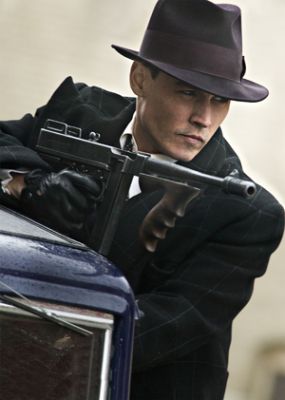Review: Public Enemies
By Rob Christopher in Arts & Entertainment on Jul 2, 2009 3:20PM
 Once upon a time there was an outlaw named John Dillinger. While the country was in the depths of the Great Depression, he robbed a lot of banks. In fact he robbed so many that the FBI made him Public Enemy No. 1. One by one all his cronies were killed, and his moll Billie Frechette was captured and put in jail. On a hot summer evening Dillinger made the mistake of going to the air-conditioned Biograph Theater to see Manhattan Melodrama, starring Clark Gable and Myrna Loy. As he left the show he was gunned down in an alley and died.
Once upon a time there was an outlaw named John Dillinger. While the country was in the depths of the Great Depression, he robbed a lot of banks. In fact he robbed so many that the FBI made him Public Enemy No. 1. One by one all his cronies were killed, and his moll Billie Frechette was captured and put in jail. On a hot summer evening Dillinger made the mistake of going to the air-conditioned Biograph Theater to see Manhattan Melodrama, starring Clark Gable and Myrna Loy. As he left the show he was gunned down in an alley and died.
That's the legend, and the plot, and the depth of Public Enemies. To quote Leonard Maltin, its only new insight is that crime doesn't pay. In a perverse attempt to camouflage what is essentially the same gangster picture that's been made since the depths of the Great Depression, filmmaker Michael Mann chooses to shoot it largely handheld on digital video and keeps the action choppy. Although the screen is filled with scores of original locations and the best production design money can buy, the movie comes off like a longer, noisier episode of Cops. It's a faux realism that feels airless and joyless. In past films like Thief and The Insider, Mann has shown a flair for emotional stylization, but here he's just dull: no glamor, but no grit either.
As usual, Johnny Depp has a certain nonchalant charisma. His Dillinger is almost like 50's-era Elvis in certain moments. But Christian Bale is woefully miscast as ace g-man Melvin Purvis. You keep hoping to see him throw down his badge and don the Batsuit. Instead all you get is Bale in stonyfaced sourpuss mode. Give the man some prunes. The other main characters are flat archetypes, especially Dillinger's cohorts Baby Face Nelson and Pretty Boy Floyd; the movie doesn't care to elucidate the motivations for anyone's behavior and they're too uninteresting to even rate as enigmas. Even Oscar-winning actress Marion Cotillard, as Dillinger's main squeeze Billie, is given little more to do than chew on her accent (although, admittedly, it's a delicious one.)
The truly interesting figures are all shoved into the background, including the female sheriff of Crown Point, Indiana (Lili Taylor, wasted), mobster Frank Nitti (Bill Camp) and no-nonsense Texas agent Charles Winstead (an arresting Stephen Lang), who shares the film's best scene with Cotillard at the very end.
In fact, largely because we know what's coming the end is the best part of the movie: fate relentlessly closing in on Dillinger during a carefully calibrated sequence at the Biograph. Closeups of Gable and Loy are skillfully intercut with the audience in the theater and the agents taking their positions on the street outside. It has an emotional resonance that's largely missing from the rest of the movie.
You might be better off staying home and renting The Untouchables instead. Sure, it plays fast and loose with history, and it's contrived as all get out, but it's got more vitality in any of its five minutes than Public Enemies has front to back.